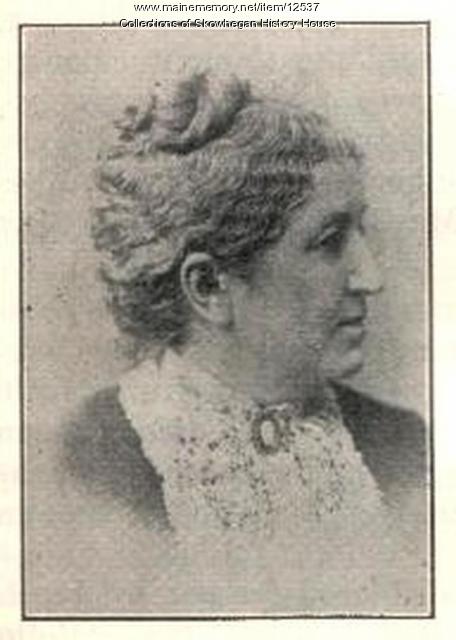Keywords: children's literature
Item 27979
Jacob Abbott and Fewacres, Farmington, 1903
Contributed by: Farmington Public Library Date: circa 1900 Location: Farmington Media: Engraving, ink on paper
Item 81566
Walker Memorial Library Children's Room, Westbrook, 1943
Contributed by: Walker Memorial Library Date: 1943-11-07 Location: Westbrook Media: Photographic print
Exhibit
Published women authors with ties to Maine are too numerous to count. They have made their marks in all types of literature.
Exhibit
Student Exhibit: Rebecca Sophie Clarke
Sophie May, whose real name was Rebecca Clarke, was the author of over 40 books between 1861 and 1903. She wrote the "Little Prudy Series" based on the little town of Norridgewock.
Site Page
Farmington: Franklin County's Shiretown - Jacob Abbott and Fewacres, Farmington, 1903
"… literature deserving of the term "children's literature." He and his four sons had a long association with Farmington, and with the forerunner…"
Site Page
Farmington: Franklin County's Shiretown - Jacob Abbott
"… Project: Jacob Abbott." The Baldwin Online Literature Children's Project. 2000. Yesterday's Classics, LLC. Retrieved 3 Dec."
Story
In an Old, Abandoned Island House, I Found my Mentor and my Muse
by Robin Clifford Wood
An aspiring writer finds inspiration and a mentor from the past in an old island home.
Story
A poem about my experiences in Vietnam
by Doug Rawlings
A poem about my experiences in Vietnam
Lesson Plan
Longfellow Studies: Integration of Longfellow's Poetry into American Studies
Grade Level: 9-12
Content Area: English Language Arts, Social Studies
We explored Longfellow's ability to express universality of human emotions/experiences while also looking at the patterns he articulated in history that are applicable well beyond his era. We attempted to link a number of Longfellow's poems with different eras in U.S. History and accompanying literature, so that the poems complemented the various units. With each poem, we want to explore the question: What is American identity?
Lesson Plan
Longfellow Studies: "Evangeline: A Tale of Acadie"--Selected Lines and Illustrations
Grade Level: 6-8, 9-12
Content Area: Social Studies, Visual & Performing Arts
Henry Wadsworth Longfellow, Maine's native son, is the epitome of Victorian Romanticism. Aroostook County is well acquainted with Longfellow's epic poem, Evangeline, because it is the story of the plight of the Acadians, who were deported from Acadie between 1755 and 1760. The descendants of these hard-working people inhabit much of Maine, New Brunswick, and Nova Scotia.
The students enjoy hearing the story and seeing the ink drawings. The illustrations are my interpretations. The collection took approximately two months to complete. The illustrations are presented in a Victorian-style folio, reminiscent of the family gathered in the parlor for a Sunday afternoon reading of Evangeline, which was published in 1847.
Preparation Required/Preliminary Discussion:
Have students read "Evangeline A Tale of Acadie". Give a background of the Acadia Diaspora.
Suggested Follow-up Activities:
Students could illustrate their own poems, as well as other Longfellow poems, such as: "Paul Revere's Ride," "The Village Blacksmith," or "The Children's Hour."
"Tales of the Wayside Inn" is a colonial Canterbury Tales. The guest of the inn each tell stories. Student could write or illustrate their own characters or stories.
Appropriate calligraphy assignments could include short poems and captions for their illustrations. Inks, pastels, watercolors, and colored pencils would be other appropriate illustrative media that could be applicable to other illustrated poems and stories. Each illustration in this exhibit was made in India ink on file folder paper. The dimensions, including the burgundy-colors mat, are 9" x 12". A friend made the calligraphy.












